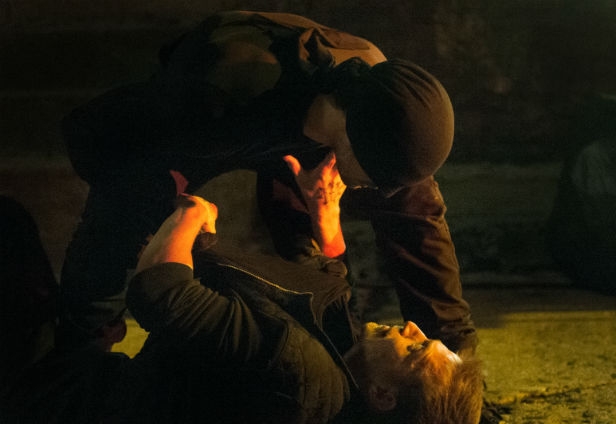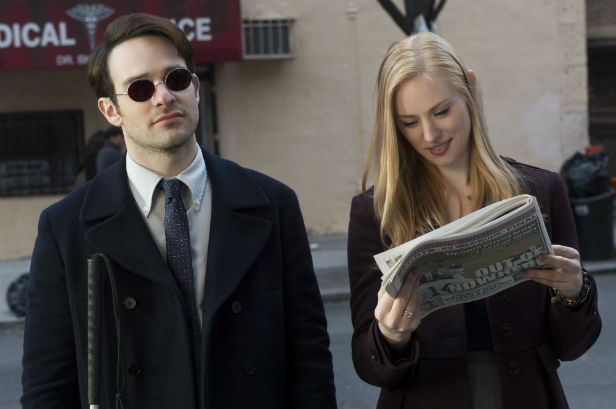The words ‘dark’ and ‘gritty’ are frequently appropriated by soundbite-chasing producers intent on giving their product credibility – and not always in an entirely accurate manner. In the case of Marvel’s Daredevil – the first in a slate of Netflix-aired TV series – however, they weren’t kidding.
Banishing the memory of Mark Steven Johnson’s 2003 nu metal music video/Ben Affleck showcase in one fell swoop, the Netflix series wisely takes its cue from some of the comics’ classic runs, most notably Frank Miller’s The Man Without Fear.
The noir-infused tone of his run couldn’t stand out more, and away from the polished surfaces of Stark Tower, classical visages of Asgard and metallic sheen of SHIELD, this is an uncompromising and lived-in area of the MCU that hasn’t been seen before, and is the perfect place in which to bring blind vigilante Matt Murdock’s world to life.
Saying that, the fingerprints of the wider Marvel Cinematic Universe are very much in evidence (the show’s events take place against the backdrop of a Hell’s Kitchen still recovering from Avengers Assemble’s Battle of New York), and the nods to the wider world that this is based in are there for those who look for them.
But crucially, Daredevil doesn’t live or die by hanging on the coattails of its big-budget forebears; it’s very much its own show, and all the better for it.
Essentially, this 13-episode run is an origin story, seeing young lawyers Matt Murdock (Charlie Cox) and Foggy Nelson (Elden Henson) attempting to kick-start their burgeoning law practice alongside their secretary (and first client) Karen Page (Deborah Ann Woll), all the while Matt sneaks of in a slapdash black costume to square off against local crime elements, led by Wilson Fisk (Vincent D’Onofrio).
It sounds straightforward enough, but fans of the comics will know that this is seldom the case where Daredevil is concerned, and the show stays very much true to the comics’ spirit in this regard.
What this means is splintered bones, blood splatters and crunching punches. While Cap can get up and stroll away after taking a beating, Murdock spends whole episodes recovering from his injuries.
A standout scene comes during the second episode, with Murdock recalling Park Chan-wook’s Oldboy as he decks a hallway full of goons in a single tracking shot. This is Marvel, but not as you’ve seen it on the big screen before. And if you haven’t worked that out by this point, Fisk decapitating some hapless goon’s head with the help of a car door should help you along.
Hell’s Kitchen itself is almost a character, helped no end by those who populate it. Murdock and Nelson’s strengths and foibles are embellished far beyond their previous on-screen personas, and in Page and nurse-by-night Claire Temple (Rosario Dawson) we have two characters that aren’t defined by their relationship to any one male.
After initially appearing unsteady in his first appearances, D’Onofrio manages to drag the character of Fisk in a whole new direction, and Vondie Curtis-Hall, Ayelet Zurer and Bob Gunton all steal scenes as Ben Urich, Leland Owlsley and Vanessa Marianna respectively. Even former unknowns like Toby Leonard Moore’s Wesley and Nikolai Nikolaeff’s Vladimir get their time to shine.
Amid this rich cast, Murdock at times feels like a periphery character in his own show – not that this is to decry Cox’s performance. Executive producer Joe Quesada cited his turn as Owen Sleater in HBO’s Boardwalk Empire as the reason for his casting, and it’s fair to say that they got it right in this regard, as Cox embodies the varying layers of Murdock with ease. He is a man without fear, but he doesn’t have a masterplan either, losing almost as much as he triumphs.
After the frenetic first half, things inevitably slow down towards the end, and the ending has the regrettable feeling of ‘to-be-continued’ about it. Still, there are far more positives to take from this than negatives.
Just as Avengers Assemble proved that great superhero movies didn’t have to be dark and gritty like The Dark Knight, Daredevil shows that Arrow and The Flash don’t have a monopoly on mixing fan service with story.
The bar has been set for Marvel on Netflix, and we look forward to seeing it raised even further.

